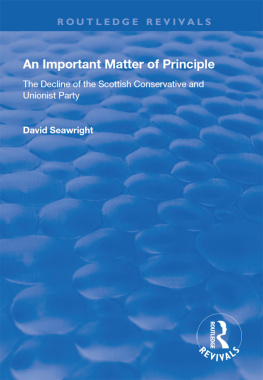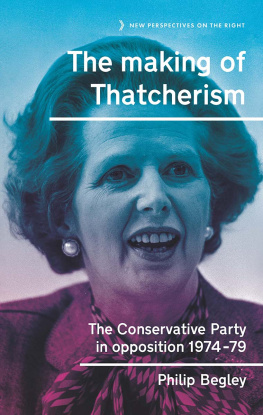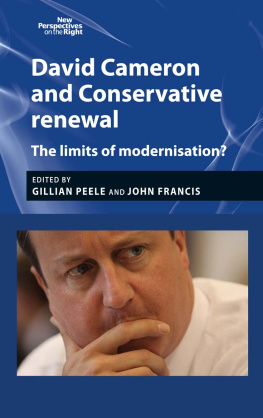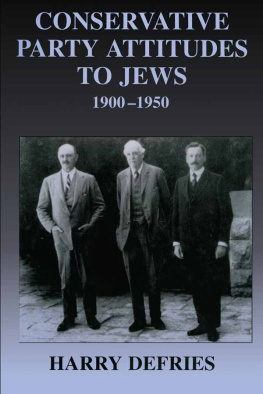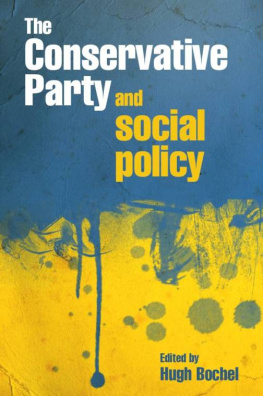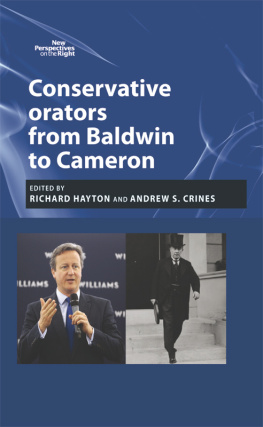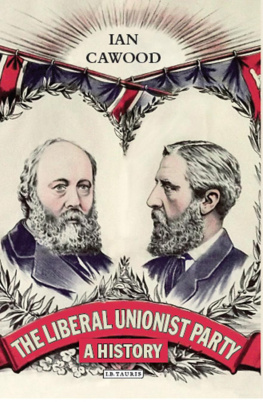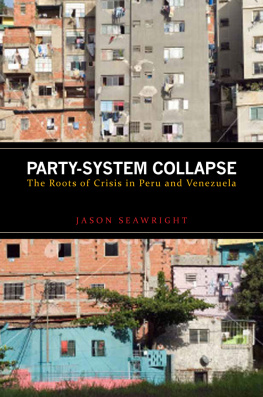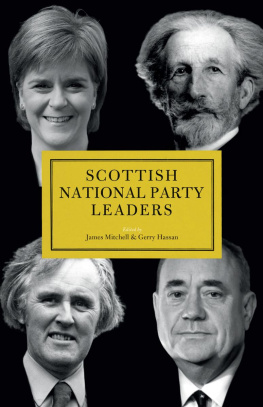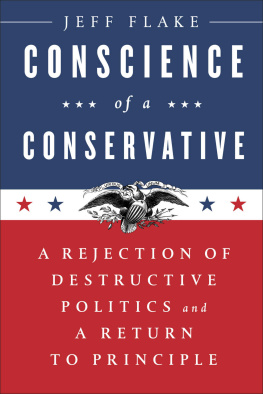An Important Matter of Principle
The Decline of the Scottish Conservative and Unionist Party
DAVID SEAWRIGHT
University of Lincolnshire and Humberside
First published 1999 by Ashgate Publishing
Reissued 2018 by Routledge
2 Park Square, Milton Park, Abingdon, Oxon OX14 4RN
711 Third Avenue, New York, NY 10017, USA
Routledge is an imprint of the Taylor & Francis Group, an informa business
Copyright David Seawright 1999
All rights reserved. No part of this book may be reprinted or reproduced or utilised in any form or by any electronic, mechanical, or other means, now known or hereafter invented, including photocopying and recording, or in any information storage or retrieval system, without permission in writing from the publishers.
Notice:
Product or corporate names may be trademarks or registered trademarks, and are used only for identification and explanation without intent to infringe.
Publishers Note
The publisher has gone to great lengths to ensure the quality of this reprint but points out that some imperfections in the original copies may be apparent.
Disclaimer
The publisher has made every effort to trace copyright holders and welcomes correspondence from those they have been unable to contact.
A Library of Congress record exists under LC control number: 98050873
ISBN 13: 978-1-138-61064-4 (hbk)
ISBN 13: 978-1-138-61067-5 (pbk)
ISBN 13: 978-0-429-46071-5 (ebk)
Contents
The idea to investigate why the Conservative and Unionist Party had declined so dramatically in Scotland began as a PhD study at the University of Strathclyde and I am grateful to the Economic and Social Research Council (ESRC) for the studentship grant which enabled me to embark on such an enquiry. Three journal articles were published as a consequence of this work, one in Contemporary Record and two in Scottish Affairs, and I am grateful for the permission of Frank Cass and the editor of Scottish Affairs to reproduce some of the material here.
Many people have given me much valuable help and assistance in the preparation of this study, too many to thank individually, but all the help I have received has been gratefully appreciated. But a special mention must be given to the staff at the Strathclyde University Computing Centre and in particular to the staff of Strathclydes Social Statistics Laboratory, Ann Mair and Sarinda Hunjan. Ann Mairs knowledge of preparing punch card data for the SPSS data analysis was invaluable and she stoically answered what must have been for her my most puerile questions. The staff at the Mitchell Library in Glasgow, the National Library of Scotland and the Bodleian Library in Oxford gave freely of their advice and support. In particular Ian Maciver and the staff of the Manuscripts Division of the National Library of Scotland were very helpful. The ESRC kindly supplied the data from the Whiteley et al, [computer file], (1995) True Blues study which I utilised and Craig Houston of National Readership Surveys supplied data on the Scottish press, I thank them both.
I am also grateful to the representatives of the various organisations mentioned in this work who gave of their valuable time to talk to me. Once again, there are far too many in these organisations to be named individually. However, without doubt, the help of Professor J. Ross Harper has been invaluable and I thank him deeply for all his help, encouragement and support.
The academic guidance and support I received has also been extensive but there are two colleagues that I am particularly indebted to. James Mitchell offered his perceptive and erudite comments and I am grateful for his sound advice. James and I will most probably not see eye to eye on many of the issues surrounding the Scottish body politic, but that in no way diminishes from the great respect I hold for his academic ability and judgement.
Last, but in no way least, I deeply thank John Curtice. John was my PhD supervisor and he not only guided my intellectual work with great patience and care but also showed extreme patience in his perseverance with my shortcomings, of which, many others would have given up long before. As a consequence, his advice has been continually sought and he has continually found time in an extremely hectic schedule, to offer his support and advice.
Of course, whilst I greatly appreciate all their help, any mistakes or inaccuracies are mine, and mine alone.
The decline of the Conservative Party in Scotland has been nothing short of dramatic. In 1955 the party secured a half of the Scottish vote. At the 1987 and 1992 elections it won no more than a quarter. And at the last election it suffered its worst ever defeat in Scotland, its share of the vote falling to just 17.5 per cent and with it the loss of all of its Westminster representation. Moreover, the partys standing is so low in Scotland that it has no European representatives either and it has less than one hundred local authority councillors out of a possible eleven hundred. In contrast, discounting the disaster of 1997, over the same period the party in England has more or less held its own. The decline was not simply of concern to the Conservative Party. It had also put a growing strain on the union between England and Scotland. The partisanship of the Scottish electorate had changed but who ran the Scottish Office between 1979 and 1997 had not. Thus, the Conservative Party had been able to run Scotland since 1979 thanks to the partys success south of the border. Inevitably the democratic legitimacy of such a state of affairs was called into question.
But despite its importance relatively little is known about why the Conservative Party has declined so precipitously in Scotland. One reason is the lack of readily available material. To understand the decline of the Conservative Party in Scotland we need first of all to understand the basis of its electoral success in the 1950s. Yet the first academic survey of electoral behaviour in Britain was only undertaken in 1963 while relatively little academic or commercial survey based research was conducted specifically into Scottish electoral behaviour before 1974. And while the October 1974 and 1979 elections were graced by full-blown academic studies in Scotland, the exercise was not repeated again until 1992 and 1997. One of the principle aims of this study will be to try and fill this information gap. To address the most crucial part of the story, what happened in the 1950s, the Gallup (British) monthly studies from that period have been employed. Individually, with Scotland constituting just ten per cent of the population, none of these surveys contains sufficient respondents to permit separate analysis of their Scottish respondents. But if we amalgamate a number of these surveys then we can generate sufficient respondents, which will considerably enhance the extent of our longitudinal analysis. Of course that only works so long as the questions in which we are interested are asked in a sufficient number of different months in any time period. While this has imposed a constraint on what has been achieved nevertheless some crucial new time series trends in Scottish voting behaviour are presented here.
Record of Decline
The electoral success of the Conservative Party in Scotland in the 1950s was the high water mark of a seventy-year advance. Its foundation was the split in the Liberal Party in 1886 following Gladstones endorsement of Irish Home Rule. Thus Liberal Unionism proved particularly important in Scotland. In 1900 the Liberals failed to win a majority of seats. By 1929 the Conservative share of the vote was only three points lower than in England.


